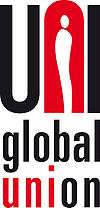UNI Global Union
 | |
| Full name | UNI global union |
|---|---|
| Founded | January 1, 2000 |
| Members | 20 million |
| Key people |
Ann Selin, President Philip J. Jennings, General Secretary Christy Hoffman, Deputy General Secretary |
| Office location | Nyon, Switzerland |
| Country | International |
| Website | www.uniglobalunion.org |
UNI Global Union is a global union federation for skills and services, gathering national and regional trade unions. It was launched on January 1, 2000, as Union Network International. Its more than 900 affiliated unions in 140 countries have 20 million members. The head office is in Nyon, near Geneva, Switzerland.
UNI was the result of the merger of four organisations: FIET (International Federation of Employees, technicians and managers), MEI (Media and Entertainment International), IGF (International Graphical Federation) and CI (Communications International, formally PTTI).
On March 2, 2009, it changed its name, to UNI Global Union.
Organisation
UNI represents several sectors of work. These are:
- Commerce
- Finance
- Telecoms
- Post and logistics
- Industry, Business and Information Technology Services (IBITS)
- IT and white collar
- Graphical
- Property services (cleaning and security workers)
- Media, entertainment, arts and sports
- Electricity
- Social insurance and private health care
- Tourism
- Hair and beauty.
- Gaming
- Temporary Work Agency
Regions
- UNI africa Head office in Abidjan / Johannesburg
- UNI americas Head office in Montevideo
- UNI asia pacific Head office in Singapore
- UNI europa Head office in BrusselsBangladesh Accord
Bangladesh Accord
UNI Global Union, along with IndustriALL Global Union, is one of the global union signatories to the Accord on FIre and Building Safety in Bangladesh, agreed in the aftermath of the Rana Plaza tragedy.
The Bangladesh Accord is a legally binding safety agreement signed by two global trade unions, a number of Bangladeshi unions, with more than 200 brands from 20 countries in Europe, North America, Asia and Australia. Almost half of all Bangladeshi factories for the export market and two million workers are covered by its scope.